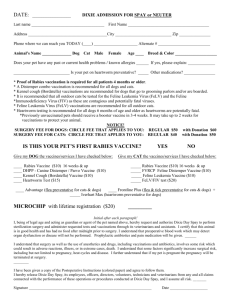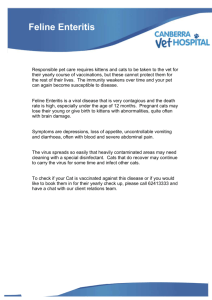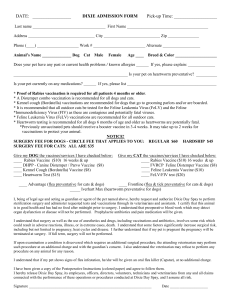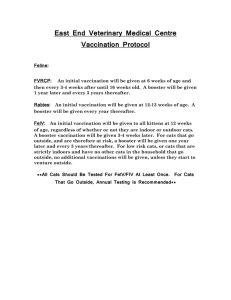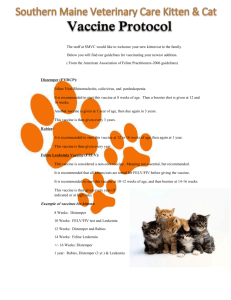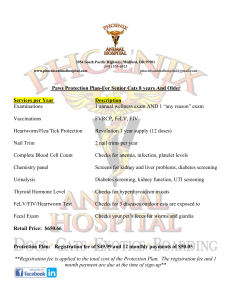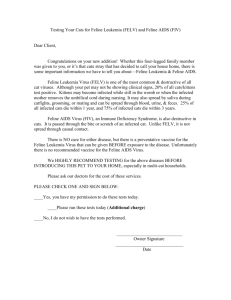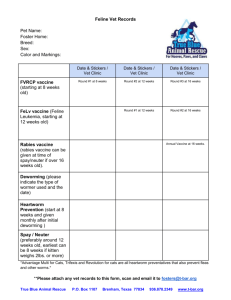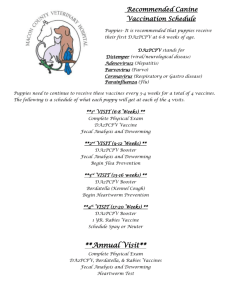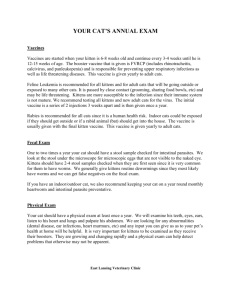two sided cheat sheet
advertisement
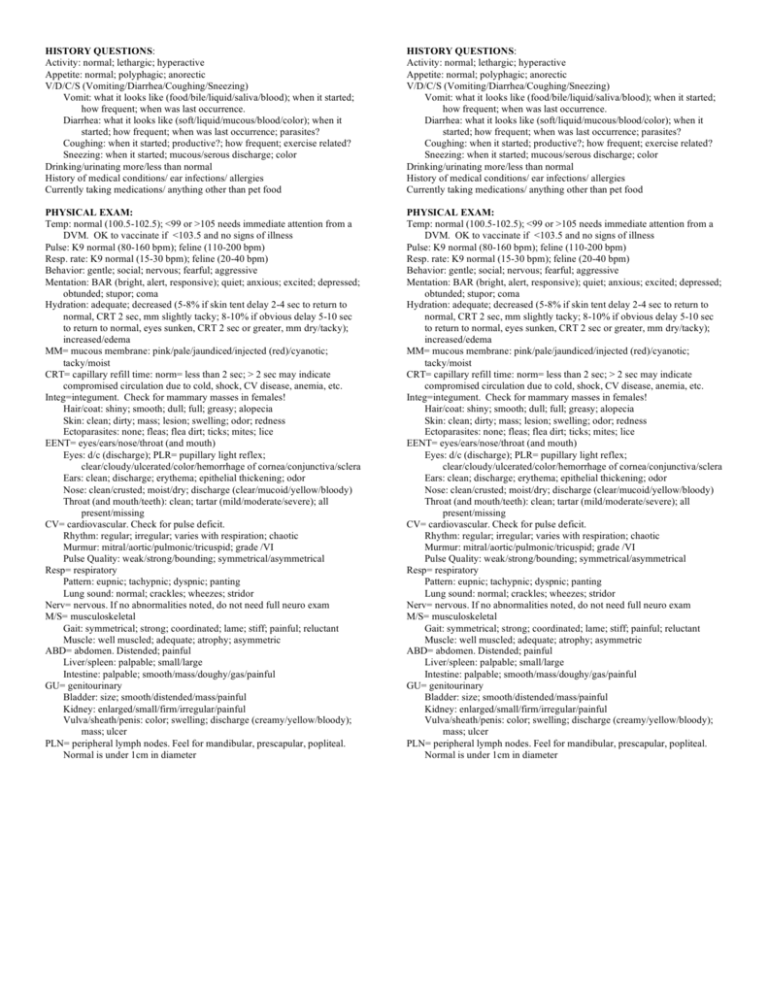
HISTORY QUESTIONS: Activity: normal; lethargic; hyperactive Appetite: normal; polyphagic; anorectic V/D/C/S (Vomiting/Diarrhea/Coughing/Sneezing) Vomit: what it looks like (food/bile/liquid/saliva/blood); when it started; how frequent; when was last occurrence. Diarrhea: what it looks like (soft/liquid/mucous/blood/color); when it started; how frequent; when was last occurrence; parasites? Coughing: when it started; productive?; how frequent; exercise related? Sneezing: when it started; mucous/serous discharge; color Drinking/urinating more/less than normal History of medical conditions/ ear infections/ allergies Currently taking medications/ anything other than pet food HISTORY QUESTIONS: Activity: normal; lethargic; hyperactive Appetite: normal; polyphagic; anorectic V/D/C/S (Vomiting/Diarrhea/Coughing/Sneezing) Vomit: what it looks like (food/bile/liquid/saliva/blood); when it started; how frequent; when was last occurrence. Diarrhea: what it looks like (soft/liquid/mucous/blood/color); when it started; how frequent; when was last occurrence; parasites? Coughing: when it started; productive?; how frequent; exercise related? Sneezing: when it started; mucous/serous discharge; color Drinking/urinating more/less than normal History of medical conditions/ ear infections/ allergies Currently taking medications/ anything other than pet food PHYSICAL EXAM: Temp: normal (100.5-102.5); <99 or >105 needs immediate attention from a DVM. OK to vaccinate if <103.5 and no signs of illness Pulse: K9 normal (80-160 bpm); feline (110-200 bpm) Resp. rate: K9 normal (15-30 bpm); feline (20-40 bpm) Behavior: gentle; social; nervous; fearful; aggressive Mentation: BAR (bright, alert, responsive); quiet; anxious; excited; depressed; obtunded; stupor; coma Hydration: adequate; decreased (5-8% if skin tent delay 2-4 sec to return to normal, CRT 2 sec, mm slightly tacky; 8-10% if obvious delay 5-10 sec to return to normal, eyes sunken, CRT 2 sec or greater, mm dry/tacky); increased/edema MM= mucous membrane: pink/pale/jaundiced/injected (red)/cyanotic; tacky/moist CRT= capillary refill time: norm= less than 2 sec; > 2 sec may indicate compromised circulation due to cold, shock, CV disease, anemia, etc. Integ=integument. Check for mammary masses in females! Hair/coat: shiny; smooth; dull; full; greasy; alopecia Skin: clean; dirty; mass; lesion; swelling; odor; redness Ectoparasites: none; fleas; flea dirt; ticks; mites; lice EENT= eyes/ears/nose/throat (and mouth) Eyes: d/c (discharge); PLR= pupillary light reflex; clear/cloudy/ulcerated/color/hemorrhage of cornea/conjunctiva/sclera Ears: clean; discharge; erythema; epithelial thickening; odor Nose: clean/crusted; moist/dry; discharge (clear/mucoid/yellow/bloody) Throat (and mouth/teeth): clean; tartar (mild/moderate/severe); all present/missing CV= cardiovascular. Check for pulse deficit. Rhythm: regular; irregular; varies with respiration; chaotic Murmur: mitral/aortic/pulmonic/tricuspid; grade /VI Pulse Quality: weak/strong/bounding; symmetrical/asymmetrical Resp= respiratory Pattern: eupnic; tachypnic; dyspnic; panting Lung sound: normal; crackles; wheezes; stridor Nerv= nervous. If no abnormalities noted, do not need full neuro exam M/S= musculoskeletal Gait: symmetrical; strong; coordinated; lame; stiff; painful; reluctant Muscle: well muscled; adequate; atrophy; asymmetric ABD= abdomen. Distended; painful Liver/spleen: palpable; small/large Intestine: palpable; smooth/mass/doughy/gas/painful GU= genitourinary Bladder: size; smooth/distended/mass/painful Kidney: enlarged/small/firm/irregular/painful Vulva/sheath/penis: color; swelling; discharge (creamy/yellow/bloody); mass; ulcer PLN= peripheral lymph nodes. Feel for mandibular, prescapular, popliteal. Normal is under 1cm in diameter PHYSICAL EXAM: Temp: normal (100.5-102.5); <99 or >105 needs immediate attention from a DVM. OK to vaccinate if <103.5 and no signs of illness Pulse: K9 normal (80-160 bpm); feline (110-200 bpm) Resp. rate: K9 normal (15-30 bpm); feline (20-40 bpm) Behavior: gentle; social; nervous; fearful; aggressive Mentation: BAR (bright, alert, responsive); quiet; anxious; excited; depressed; obtunded; stupor; coma Hydration: adequate; decreased (5-8% if skin tent delay 2-4 sec to return to normal, CRT 2 sec, mm slightly tacky; 8-10% if obvious delay 5-10 sec to return to normal, eyes sunken, CRT 2 sec or greater, mm dry/tacky); increased/edema MM= mucous membrane: pink/pale/jaundiced/injected (red)/cyanotic; tacky/moist CRT= capillary refill time: norm= less than 2 sec; > 2 sec may indicate compromised circulation due to cold, shock, CV disease, anemia, etc. Integ=integument. Check for mammary masses in females! Hair/coat: shiny; smooth; dull; full; greasy; alopecia Skin: clean; dirty; mass; lesion; swelling; odor; redness Ectoparasites: none; fleas; flea dirt; ticks; mites; lice EENT= eyes/ears/nose/throat (and mouth) Eyes: d/c (discharge); PLR= pupillary light reflex; clear/cloudy/ulcerated/color/hemorrhage of cornea/conjunctiva/sclera Ears: clean; discharge; erythema; epithelial thickening; odor Nose: clean/crusted; moist/dry; discharge (clear/mucoid/yellow/bloody) Throat (and mouth/teeth): clean; tartar (mild/moderate/severe); all present/missing CV= cardiovascular. Check for pulse deficit. Rhythm: regular; irregular; varies with respiration; chaotic Murmur: mitral/aortic/pulmonic/tricuspid; grade /VI Pulse Quality: weak/strong/bounding; symmetrical/asymmetrical Resp= respiratory Pattern: eupnic; tachypnic; dyspnic; panting Lung sound: normal; crackles; wheezes; stridor Nerv= nervous. If no abnormalities noted, do not need full neuro exam M/S= musculoskeletal Gait: symmetrical; strong; coordinated; lame; stiff; painful; reluctant Muscle: well muscled; adequate; atrophy; asymmetric ABD= abdomen. Distended; painful Liver/spleen: palpable; small/large Intestine: palpable; smooth/mass/doughy/gas/painful GU= genitourinary Bladder: size; smooth/distended/mass/painful Kidney: enlarged/small/firm/irregular/painful Vulva/sheath/penis: color; swelling; discharge (creamy/yellow/bloody); mass; ulcer PLN= peripheral lymph nodes. Feel for mandibular, prescapular, popliteal. Normal is under 1cm in diameter TESTING: For FeLV/FIV test and Heartworm test, use a heparinzed syringe to get the sample. Heparinze the syringe by drawing up heparin and then squirting it back into the bottle. This way, only a small amount of heparin remains in the syringe. Try to get 0.5 to 1 mL of blood. Cats/Kittens over 12 weeks of age: FeLV/FIV Test Dogs/Puppies over 6 months of age: Heartworm Test if clinical signs (exercise intolerance, coughing, etc.) TESTING: For FeLV/FIV test and Heartworm test, use a heparinzed syringe to get the sample. Heparinze the syringe by drawing up heparin and then squirting it back into the bottle. This way, only a small amount of heparin remains in the syringe. Try to get 0.5 to 1 mL of blood. Cats/Kittens over 12 weeks of age: FeLV/FIV Test Dogs/Puppies over 6 months of age: Heartworm Test if clinical signs (exercise intolerance, coughing, etc.) VACCINES: DHPP (Distemper Hepatitis Parainfluenza Parvovirus) Give SQ intrascapular area Puppies: minimum age= 6 weeks; give booster vaccines every month, so that last vaccine is given when puppy is over 16 weeks old. Dogs: will need a booster one month later, then one year later, then vaccine can be given every three years VACCINES: DHPP (Distemper Hepatitis Parainfluenza Parvovirus) Give SQ intrascapular area Puppies: minimum age= 6 weeks; give booster vaccines every month, so that last vaccine is given when puppy is over 16 weeks old. Dogs: will need a booster one month later, then one year later, then vaccine can be given every three years FVRCP (Feline Viral Rhinotracheitis, Calicivirus, Panleukopenia) Give SQ right front leg as distal as possible Kittens: minimum age= 6 weeks; give booster vaccines every month, so that last vaccine is given when kitten is over 16 weeks old. Cats: will need a booster one month later, then one year later, then vaccine can be given every three years. FVRCP (Feline Viral Rhinotracheitis, Calicivirus, Panleukopenia) Give SQ right front leg as distal as possible Kittens: minimum age= 6 weeks; give booster vaccines every month, so that last vaccine is given when kitten is over 16 weeks old. Cats: will need a booster one month later, then one year later, then vaccine can be given every three years. FeLV (Feline Leukemia Virus) Give SQ left hind leg as distal as possible Cats and kittens (minimum age of 12 weeks); will need a booster vaccine one month later, then one year later, then vaccine can be given every three years. FeLV (Feline Leukemia Virus) Give SQ left hind leg as distal as possible Cats and kittens (minimum age of 12 weeks); will need a booster vaccine one month later, then one year later, then vaccine can be given every three years. RABIES: Give SQ right hind leg as distal as possible All animals: First vaccine can be given once animal is 16 weeks of age. Next vaccine is given one year later, then every three years. RABIES: Give SQ right hind leg as distal as possible All animals: First vaccine can be given once animal is 16 weeks of age. Next vaccine is given one year later, then every three years. DEWORMING: all animals over 8 weeks of age will get oral Pyrantel Pamoate (Strongid) liquid at the time of vaccination (every time they get vaccinated). Pyrantel Pamoate: (1 mL/10 lbs body weight); gets roundworms, which look like spaghetti, and are most common. Praziquantel (See doctor): If there is evidence of tapeworms (look like rice granules in feces). Can use Drontal or Drontal Plus for dogs or cats (check bottle), or Droncit injectable for cats. Fenbendazole (See doctor): If there is evidence of whipworms (fresh blood in feces). Can use Drontal Plus for dogs or cats (check bottle). DEWORMING: all animals over 8 weeks of age will get oral Pyrantel Pamoate (Strongid) liquid at the time of vaccination (every time they get vaccinated). Pyrantel Pamoate: (1 mL/10 lbs body weight); gets roundworms, which look like spaghetti, and are most common. Praziquantel (See doctor): If there is evidence of tapeworms (look like rice granules in feces). Can use Drontal or Drontal Plus for dogs or cats (check bottle), or Droncit injectable for cats. Fenbendazole (See doctor): If there is evidence of whipworms (fresh blood in feces). Can use Drontal Plus for dogs or cats (check bottle). HEARTWORM PREVENTATIVE: All puppies/dogs should get monthly heartworm preventative. Make sure to stress the importance of giving the preventative EVERY month to prevent the disease Heartgard Plus minimum age= 6 weeks HEARTWORM PREVENTATIVE: All puppies/dogs should get monthly heartworm preventative. Make sure to stress the importance of giving the preventative EVERY month to prevent the disease Heartgard Plus minimum age= 6 weeks FLEA TREATMENT: Advantage minimum age= 7 weeks. All animals should get flea treatment every month. FLEA TREATMENT: Advantage minimum age= 7 weeks. All animals should get flea treatment every month.
